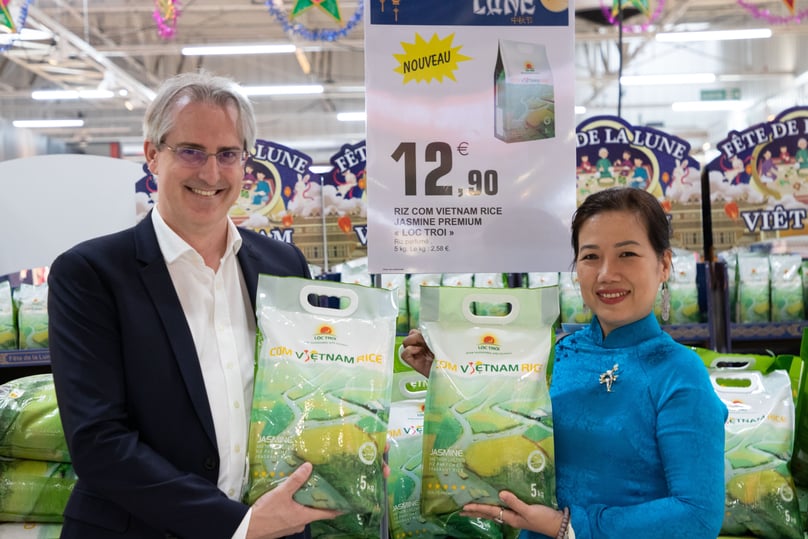Loc Troi Group rides wave of high-quality rice exports
Vietnam is the world’s third-largest rice exporter, and agricultural services and food conglomerate Loc Troi Group JSC is expanding high-quality rice production for export, says CEO Nguyen Duy Thuan. These efforts are being funded by seven banks - six foreign and one Vietnamese - with a $100 million syndicated loan issued for the group last October.
What are the main directions of your rice export strategy?
We are focusing on high-end markets based on our “order first, process next” strategy. Our exports are based on the requirements of each market, with a focus on the standards set by the U.S., Europe, and Japan. These markets are followed by the Philippines and Africa which both make regular orders. We take orders throughout the year and then streamline our supply accordingly. Specially, we provide traceability for our exported rice.
What does Loc Troi do to help build a global brand for Vietnamese rice?
We work with Vietnamese farmers, local authorities, and regulators to maintain the quality of Vietnamese rice. Loc Troi in 2020 achieved a perfect 100 in the Sustainable Rice Platform (SRP) index.

Loc Troi Group’s jasmine rice at a market in France. Photo courtesy of the group.
What are your export plans this year?
We signed a deal in December to supply 500,000 tons of rice to leading rice exporter Vietnam Northern Food Corp., or Vinafood I, in 2023. So far this year, we’ve inked about 80% of the orders for 2023.
Green production is a current global trend to minimize negative impacts on the environment. How is Loc Troi's sustainable production journey progressing?
We’ve been embracing green production as well as sustainable and organic production.
Regarding SRP, we and about 150 farmers in the provinces of An Giang, Kien Giang, and Dong Thap from 2016 to 2017 continuously applied the SRP standards. The farmers reduced about 15% of input costs, 25% of planting water, and 25% of greenhouse gas emissions, thereby increasing their profit by about 12%.
Starting in 2018, we expanded the SRP standard scale to 11,000 hectares in the six Mekong Delta provinces of An Giang, Dong Thap, Kien Giang, Long An, Bac Lieu, and Hau Giang. This has proved that the SRP standards are suitable for practical rice cultivation in the entire Mekong Delta, and these standards are being maintained in all our plantations.
Control Union Certifications, an independent, internationally operating certification body that carries out inspections and issues certificates, issued its SRP standard certificate to us in 2020, 2021 and 2022 in a row. These certifications can be found on the Global G.A.P database.
Regarding organic cultivation, from July to December last year, we cooperated with Ca Mau province’s Agriculture Promotion Center to implement a combined organic shrimp-rice in Khanh Binh Dong commune, Tran Van Thoi district. The project covers 40 hectares for ST25 rice cultivation using organic fertilizers. Our technical staff supervised 30 local farmers, and we bought all their crops.
From December 12 to 16, 2022, Control Union Certifications came to evaluate and certify that the model, including our milling plants in Bac Lieu and Long An provinces, meet the requirements of organic integrity based on USDA-NOP standards from the U.S. and E.U.
What corporate social responsibility programs has Loc Troi enacted to support communities in Vietnam?
We’ve been carrying out many CSR activities in different localities. They include initiatives in which we and farmers join hands to protect the environment, and we provide assistance for junior students living in difficult circumstances in An Giang province. We’ve carried out our “Clean water for schools” project in rural areas, and organized Mid-Autumn Festival activities for children. In addition, we’ve provided relief aid to areas hit by natural disasters, and in-kind donations to low-income residents.




